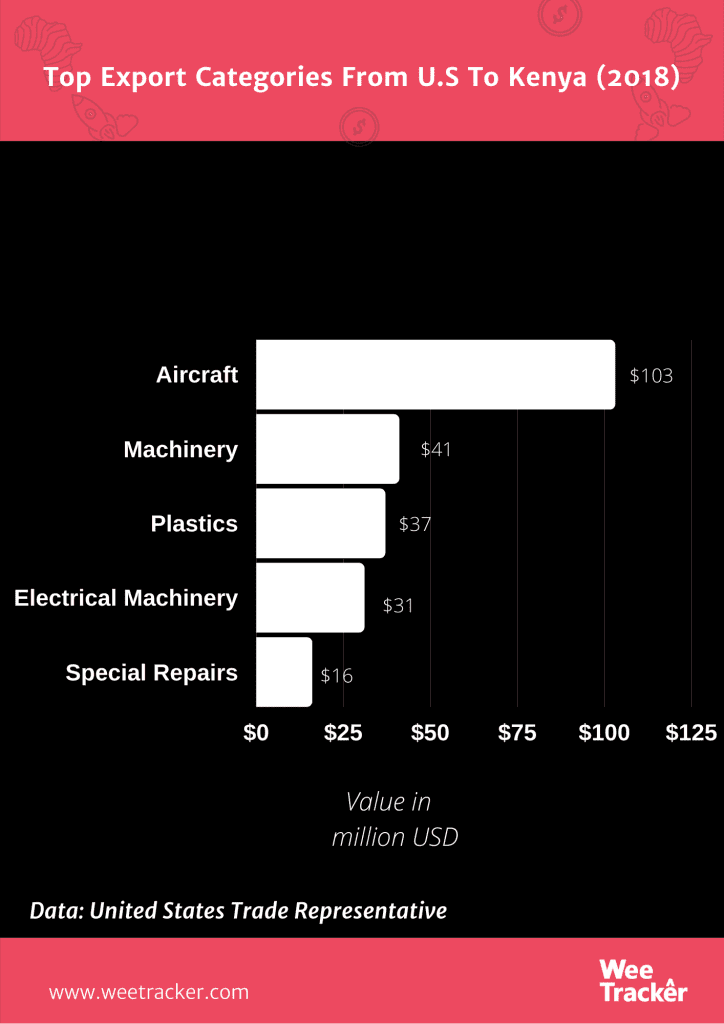Is Kenya’s Free Trade Deal With The U.S Dead On Arrival?

The African Continental Free Trade Agreement (AfCFTA) has to be the most talked-about trade deal. Nevertheless, another agreement between Kenya and the United States is already on the cards. Since it’s not every day a developing African nation tries to establish a trade agreement with a world power like America, the development has been shrouded in well-placed controversy.
The Backstory
It was in February 2020 was the Trump-led American administration announced that it would start talking with Kenya for a free trade area. While the step is partly to counter China’s influence on the East African nation, it was the United States’ first trade treaty with a country in Sub-Saharan Africa. Because it negotiated something similar with Morocco back in 2004, this economic understanding is now America’s second with an African nation.
Kenya-U.S bilateral trade amounts to USD 1 Bn annually. Still, Kenya is America’s 98th-largest trading partner, which raises concerns that the deal would not make much economic difference in the economy of the United States. The most significant imports of American commodities to Kenya include aircraft, machinery, and agricultural goods. On the other hand, America only imports Kenyan tree nuts, coffee, and apparel.

The trade agreement is a milestone for Kenya, but the United States sees the move partly in geopolitical terms. America believes that by negotiating, it would provide a model for other trade deals with other African countries—a rather weighty step in its bid to counter China’s influence in the continent. More so, Washington sees Kenya as a potentially valuable ally in its campaign against militant al-Shabab insurgents in Somalia, a neighboring East African nation.
Counter Undercover
Anytime America says it wants to deepen economic ties with any nation in Africa, talks of countering China’s influence in the continent always surface. This case, as mentioned, is no different. Kenya is the economic powerhouse of East Africa, and home to a number of industries, within which there are billions of dollars in Chinese strategic investment which Washington looks to measure up—and then outmatch. For one, there is a 300-mile railway that connects Nairobi to Mombasa, which China spent USD 4 Bn building.
The Kenya-U.S trade deal, if realized, would more or less serve as a replacement for a longstanding agreement known as the African Growth and Opportunity Act. The initiative made it possible for as many African countries as possible to export their goods to America without having to worry or fuss about quotas or tariffs. Nevertheless, the act will expire by 2025.
Beijing maintains that the billions it commits to Africa are aimed at economic development. As such, a good number of countries have opened their doors to infrastructural improvements, which have actually ushered in a better flow of commerce. Nevertheless, China’s presence in the continent is tarnished by billion-dollar debts. African countries owe Beijing—as well as racism controversies that re-emerged recently.
Resumed Talks For Kenya-U.S Trade
Talks have resumed for the free trade agreement to be implemented in July (2020). But Kenya is yet to identify its priority areas, while the United States pretty much has its expectations all spelled out. Here, it comes to mind that America’s economy is about 200 times bigger than Kenya’s. That means, the U.S can afford a host of things that the East African nation would have to either think twice about or make a colossal mistake that could contribute to economic shattering.
The Covid-19 outbreak, rising food insecurity, the devastating effects of much-talked-about climate change and ongoing negotiation of Phase II of the AfCFTA makes it the worst possible time for Kenya to be embarking on a free trade agreement of such caliber—one that guarantees duty-free market access to what is the world’s largest economy. Debt, locust plague, flooding, and market instability are already a huge problem, not only in Kenya but also in East Africa.
According to analysts, America’s seeming haste to conclude the terms of the agreement with Nairobi before the full settlement of the AfCFTA sends mixed signals. Unfortunately, the Kenyan capital appears to be dragging its feet when it comes to releasing its negotiation objectives. Neither has it consulted with critical stakeholders to be pointed in the right direction. Right now, it appears that most of the to-be deal is already in favor of the United States.
Resentments Back Home
In its diplomatic play against the powers in Beijing, mostly, the United States expects unfettered access into the Kenyan market. Washington identified 21 priorities, cutting across financial services, manufacturing, pharma, agriculture, and ICT, which it expects to be able to access freely when the trade agreement is finalized and implemented. However, it is unclear what Kenya stands to gain from the deal that it does not already have with the Opportunity Act or that it won’t have with the upcoming AfCFTA.
Kenya’s move to bargain free trade with America has been criticism from some African countries. Most of these nations have signed the AfCFTA, and the East African Community bloc perceive Kenya’s decision to engage America alone as a contradiction of regional treaties. Long story short, the Kenya-U.S trade deal is feared to undermined the AfCFTA. But Uhuru Kenyatta says the deal with America will serve as a reference point for other African countries.
According to critics, Kenya is making a mistake that has what it takes to eradicate its yet-to-be-stable agricultural and manufacturing sectors. Opening up its fragile market to the United States could spotlight its lack of the muscle for unrestricted trade with a world power. The East African Trade Network—one of the bodies raising an eyebrow towards the deal—believes that Kenya’s pursuit of the deal will make it vulnerable to distorted competition that’d mostly favor America.
There remains only little reason that the Kenya-U.S trade would make Kenya an economic trailblazer.
Image: U.S Embassy In Kenya